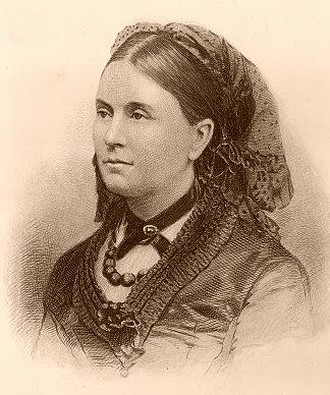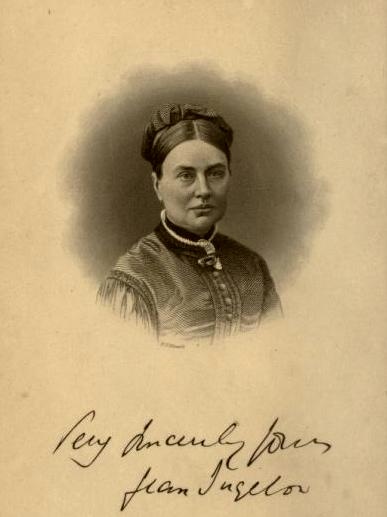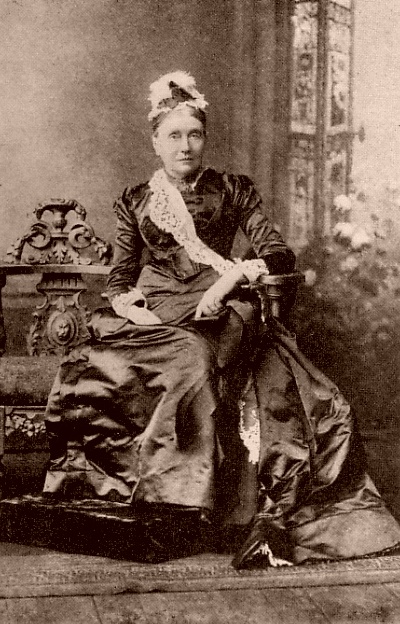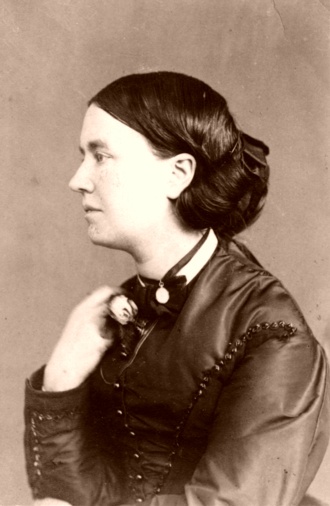|
A RHYMING CHRONICLE
OF INCIDENTS AND FEELINGS:
a review by William Hendry Stowell in the Eclectic Review Vol.
27, 1850.
LETTER TO MISS
HOLLWAY (Jean Ingelow's cousin) from
Alfred Tennyson regarding A Rhyming Chronicle of Incidents and
Feelings. Undated.
A RHYMING CHRONICLE
OF INCIDENTS AND FEELINGS:
reviewed by Henry Fothergill Chorley in
THE ATHENĈUM,
March 23, 1850.
ALLERTON AND
DREUX: a review published in
The Church of England Quarterly Review, Vol. XXXI. 1852.
POEMS:
reviewed by Gerald Massey in THE ATHENĈUM, July 25, 1863.
|
 |
|
"What most people call Woman's Rights I
call
Woman's Duties, rights and duties in
this case
being convertible terms." |
JEAN
INGELOWS POEMS:
The North American Review, Volume 98, Issue 203,
April 1864.
ADELAIDE
A. PROCTER AND JEAN INGELOW:
The Continental Monthly, Vol. V. June, 1864.
A STORY OF
DOOM, AND OTHER POEMS.
By JEAN INGELOW, Boston:
Roberts Brothers. The Atlantic Monthly,
Vol. XX., issue 119. 1867.
TEA
WITH JEAN INGELOW:
and Gerald Massey fails to impress! The Living Age, Vol. XCIV.,
1867.
MONITIONS OF THE UNSEEN,
and Poems of Love and Childhood: brief reviews:
Scribner's,
November 1870; Harper's,
December 1870.
THE WELFARE
OF WOMEN: a letter to
the editor of the Woman's Journal. The Deseret News (Utah,
U.S.A.), 19 February, 1873.
"OFF
THE SKELLIGS": a reasonable
synopsis, if an unenthusiastic review. The Atlantic Monthly,
Vol. XXXI., 1873.
"FATED
TO BE FREE":
a review of Jean Ingelow's second
successful novel. The Times,
Sep 30, 1875."SARAH DE BERENGER": two
reviews of Jean Ingelow's third novel;
Harper's Vol. XL., 1880
and The Atlantic Monthly,
Vol. XLV., 1880.
 |
|
O once with me
It was all one, such joy I had at heart,
As I heard sing the morning star, or God
Did hold me with an Everlasting Hand,
And dip me in the day. |
|
MISS INGELOW
AND MRS. WALFORD:
an extensive essay by Harriet Waters Preston on the writing of Jean
Ingelow and of Lucy Bethia Walford (18451915). From Atlantic
Monthly, Vol. LVI., 1885.
POEMS OF THE
OLD DAYS AND THE NEW:
Boston, Roberts Brothers, 1885 ― an
unfavourable review. The New York Times, 16 August, 1885.
DON JOHN.
A fair, if brief summary of the story.
JOHN
JEROME.
HIS THOUGHTS AND WAYS.
A Book without a Beginning.
By JEAN INGELOW, Boston: ROBERTS
BROTHERS. A good
review ― looks as if the reviewer actually read the book ― in the New
York Times, 7 Nov., 1886.
THE POETRY
OF JEAN INGELOW:
by K. E. COLEMAN. The Girl's Own Paper,
Jubilee Edition, summer, 1887.
A POPULAR
ENGLISH POET: from the
Ogden Standard Examiner (Utah, U.S.A.), 31 July, 1892.
A MOTTO CHANGED:
three contrasting, sketchy reviews from the American press of Miss Ingelow's late novel.
Atlantic
Monthly, Harper's Magazine,
and the New York Times.
HANDWRITING:
a barely legible sample of Jean Ingelow's 'scrawl' (undated).
JEAN INGELOW:
an appreciation, written following her death. The Living Age
(ex-The Academy),
Vol. CCXIV.,
1897.

JEAN INGELOW.
Photo by Barrauds.
|
"Woman is not merely the female man. She is from him a strangely
different creature. Nothing that
breathes is such a contrast as the
man is to his mate." |
A POETIC TRIO:
correspondence (1863) between Christina Rossetti and Dora Greenwell, and
between Jean
Ingelow and Dora Greenwell. The Living Age (ex-Athenĉum)
Vol. CCXIV., 1897.
OF JEAN
INGELOW: anecdotes about her and facts about
her books. New York Times, August 7, 1897.
JEAN INGELOW:
a retrospective appraisal by Jennette Atwater Street. The Citizen,
Vol. 3, No. 10, December, 1897.
|
 |
|
A carte de visite by Elliott & Fry.
_________
|
The old red wall one cannot see
beyond.
That is the garden.
In the wall a door
Green, blistered with the sun. You open
it,
And lo! a sunny waste of tumbled hills
And a glad silence, and an open calm. |
|
JEAN INGELOW:
an extensive essay by Mabel C. Birchenough on the poetry and prose of Jean
Ingelow. From the Fortnightly Review, Vol. 71, No. 287, March 1, 1899.
JEAN INGELOW:
Mackenzie Bell's short but comprehensive overview of Jean Ingelow's
poetry and prose, published in
THE POETS AND POETRY
OF THE NINETEENTH CENTURY,
1905.
JEAN INGELOW:
a chapter from "Lives of Girls Who Became Famous," by Sarah K. Bolton
(pub. 1914). Well worth reading for its interesting and revealing
anecdotes of Miss Ingelow.
A NOTE ON
JEAN INGELOW:
for the reasons
Lafcadio Hearn explains in his
excellent analysis (pub. 1916),
The High Tide on the Coast of Lincolnshire (1571)
is Jean Ingelow's greatest and most original poem (but, I
suggest, if this is so, then Divided follows
very closely).
JEAN INGELOW:
from "Notable Women Authors of the Day", by Helen C. Black.
London: Maclaren and Co., 1906. Standard
biographic stuff for the first few paragraphs, but becomes more
interesting beyond as much is derived from interview (which appears to
date from 1889) and observation rather than report and hearsay.
IMPRESSIONS OF
JEAN INGELOW:
from "Recollections of Fifty
Years," by Isabella Fyvie Mayo.
BIOGRAPHIC SKETCH:
appears as the Introduction to 'Mopsa the Fairy'
in the Everyman's Library series (ca 1912).
THE
QUEEN OF VICTORIAN VERSE:
Ray Carradine salutes the work
of a great Lincolnshire poet. This article first appeared in Lincolnshire Life,
September 1995, and is reproduced by kind permission of the Editor. |
